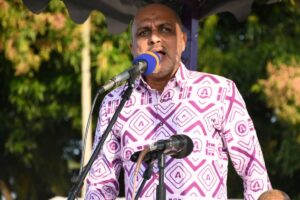By Joseph Waziri
The 28th Conference of Parties (COP28) witnessed a renewed commitment from African Heads of State to participate in the global carbon market. While this enthusiasm is commendable, a crucial question lingers: is Africa truly prepared to navigate the complexities of this market and reap its potential benefits
The answer, unfortunately, is a resounding no. Africa’s legal and regulatory landscape for carbon markets is riddled with challenges and gaps that could leave the continent vulnerable to exploitation and hinder its ability to maximise its economic, social, and environmental gains.
It does not help matters that the regulation of International Carbon Credits (ICCs) won’t be operational for at least another year – and probably two – after delegates to the COP28 failed to find agreement on operationalising Article 6 of the Paris Climate Agreement.
According to the Kenya Institute of Public Policy Research and Analysis (KIPPRA), limited awareness and understanding of carbon markets among policymakers, businesses, and communities is another key constraint to the carbon market growth in Africa. This hampers the adoption and implementation of carbon market initiatives, as stakeholders may not fully comprehend the potential benefits or mechanisms involved.
The presence of inconsistent or underdeveloped legal frameworks further indicates a broader deficiency in comprehensive understanding and engagement at the policy level. Inadequate legal structures may impede the establishment of clear regulations, standards, and incentives necessary for the successful operation of carbon markets, hindering the creation of an enabling environment.
On October 28, 2022, Tanzania Minister of State, Vice President’s Office, Union and Environment (Minister) published the Environmental Management (Control and Management of Carbon Trading) Regulations, 2022 under Government Notice No. 636 of 2022 (Regulations) signalling Tanzania’s formal participation in the global carbon trading industry.
In Kenya, President William Ruto signed into law the Climate Change (Amendment) Bill 2023 on September 1, setting the stage for the regulation of carbon markets.
But translating this political will into concrete action poses a significant hurdle. While leaders may express support for carbon markets, competing national priorities like healthcare, infrastructure, and education can often overshadow environmental concerns. Africa Sustainable Development Report 2022 by the United Nations Economic Commission for Africa (UNECA) highlights how limited resources often force African governments to prioritise short-term economic gains over long-term environmental sustainability.
Africa’s relatively nascent stage of industrialisation presents a double-edged sword. While lower emissions compared to developed nations position Africa favourably in carbon credit generation, limited industrial activity translates to less focus on environmental regulations and carbon capture technologies. This lack of preparedness could hinder Africa’s ability to participate effectively in the carbon market.
Despite these challenges, there is an opportunity for Africa to educate itself on the intricacies of carbon markets and position itself as a key player in the global carbon trading landscape. By investing in education and awareness-raising initiatives, African countries can empower decision-makers to make informed choices that balance economic development with environmental sustainability. Furthermore, by leveraging carbon markets, Africa stands to benefit economically, socially, and environmentally, unlocking new avenues for green growth and sustainable development.
The solution lies in a measured approach. African nations must prioritise education and awareness campaigns. Citizens, policymakers, and community leaders all require a thorough understanding of carbon markets, including potential benefits and pitfalls, before entering into any binding agreements.
Furthermore, seeking expert legal and financial counsel is crucial to ensure contracts are fair, transparent, and serve the long-term interests of African nations and their citizens. Taking the time to build a robust legal and regulatory framework, coupled with widespread public education, will empower Africa to participate in the carbon market responsibly and reap its maximum potential.
Properly regulated carbon markets aim to benefit all parties, including African nations. This is why the Africa Carbon Markets Initiative (ACMI) was launched at COP27 to dramatically scale voluntary carbon markets across Africa by scaling the market to 300 million carbon credits retired annually by 2030, and 1.5 billion credits annually by 2050; unlocking $6 billion in revenue by 2030 and over $120 billion by 2050; supporting 30 million jobs by 2030 and over 110 million jobs by 2050.
ACMI’s high-integrity principles include the intermediation steps of the value chain and the fair pricing of carbon credit transactions, as well as fair benefit sharing. ACMI seeks to ensure that carbon markets benefit African nations directly by funding sustainable projects. It aims to minimise the involvement of middlemen and maximise the benefits for local communities.
Africa’s legal and regulatory landscape for carbon markets is at a critical juncture, with significant opportunities for growth and development. By addressing challenges such as limited awareness and insufficient political will, African countries can harness the potential of carbon markets to drive sustainable development and combat climate change.
However, this requires a concerted effort to educate decision-makers and foster a culture of environmental stewardship. As the saying goes, “There is no hurry in Africa” – let us take the time to build a solid foundation for a greener, more prosperous future.
Joseph Waziri is a Partner, Tax Services, at Breakthrough Attorneys based in Tanzania















